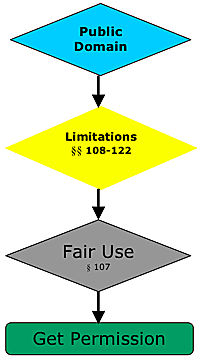How do I know if something is copyrighted?
The Law.

Copyright law, 17 U.S.C. § 101 et seq. protects original works of authorship. The Copyright Act gives the owner of a copyright the exclusive right to the following: make copies, create derivative works, distribute the work, display or perform the work publicly.
Scope of Copyright
Copyright law applies to all original expression in a fixed format, including traditional works like books, photographs, architectural drawings, music, drama, and sculpture. The law also adapts to changes in technologies and includes motion pictures, electronic media, software, multimedia works, and some databases.
No Copyright Symbol or Registration is Necessary
A copyright interest attaches to an original work that is “fixed in any tangible medium of expression” at the work’s creation. Registration is not required to obtain a copyright, though registration may be required to enforce a copyright in federal courts. Works published after 1989 do not need to have a copyright notice to enjoy copyright protection. If in doubt, assume copyright applies.
Public Domain Works
Facts, ideas, U.S. government works and expired works are in the public domain and may be freely used unless another form of content control such as a license agreement or technological protection measure is used. Any United States work published before 1923 is in the public domain. Works published from 1923 through 1978 are protected for 95 years from the publication date if proper copyright formalities were followed. Since 1978, works generally have copyright protection for the life of the author plus 70 years.
Exceptions and Limitations
Notwithstanding the owner’s exclusive rights, users may make copies if the copies fit into specified exceptions and limitations as defined by 17 U.S.C. §§107- 122. Of particular interest are Fair Use (§107), the Library Exception (§108) , the First Sale Doctrine (§109), and Classroom and Distance Education (TEACH) exceptions (§110). These are described more fully below.
If No Exception Applies, Seek Permission
Unless an exception applies, users must obtain permission from the copyright owner to copy, distribute, display, or perform a copyrighted work in any medium for any purpose.
Ownership of Copyright
The Copyright Act gives ownership of copyright to the “author” of the work. Copyright protections are given to an original work that is “fixed in any tangible medium of expression: at the work’s creation.” Registration is not required, and after 1989 the presence of a copyright notice was not required for the work to be protected.
Public Domain Works
Facts, ideas, U.S. government works and any United States work published before 1923 are considered public domain works and may be freely used unless protected by license agreements or technological protection measures. Once a work enters the public domain, it can be used by anyone for any purpose. Learn more about Public Domain.
Peter Hirtle created a very handy chart you can use to evaluate what material falls into the Public Domain in the United States and thus is no longer subject to the provisions of the Copyright Act.